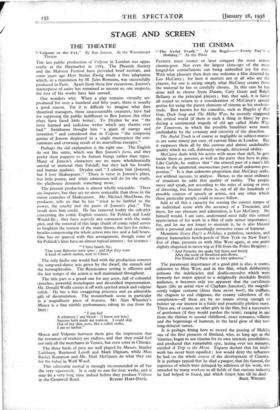THE CINEMA
" The Awful Truth." At the Regal—" Every Day's a Holiday." At the Plaza • ' FATIGUE must sooner or later conquer the most ardent cinema-goer. Not even the largest close-ups of the most longed-for constellations can bring unbridled joy for ever. With what pleasure then does one welcome a film directed by Leo McCarey ; for here it matters not at all who are the players, for one is seeing simply what McCarey creates from the material he has so carefully chosen. In this case he has done well to choose Irene Dunne, Cary Grant and Ralph Bellamy as the principal players ; but, that said, it is fairer all round to return to a consideration of McCarey's special genius for using the purest elements of cinema as his stock-in- trade. Best known for his comedies, such as Ruggles of Red Gap, Duck Soup and The Milky Way, he recently staggered the critical world (if there is such a thing in films) by pro- ducing a sentimental tragedy of old age called Make Way for Tomorrow, in which the possible banalities were made unthinkable by the certainty and sincerity of the direction.
The Awful Truth is of course as negligible in subject-matter as are some ninety per cent. of current films in Londmi. But it surpasses them all by this curious and almost undefinable quality which we call, dubiously enough, directorial ability.
McCarey deals with his actors with more than skill, he gets inside them as persons, as well as the parts they have to play. Like Carlyle, he realises that " the uttered part of a man's life bears to the unuttered, unconscious part a small unknown pro- portion." It is that unknown proportion that McCarey seeks, not without success, to analyse. Hence, to the most ordinary of situations he adds that quality of reality. The people move and speak, not according to the rules of acting or even of directing, but because there is, out of all the hundreds of possible courses of speech or action, not any other which these particular people could in nature follow.
Add to all this a capacity for sensing the correct tempo of an individual scene with the accuracy of a Toscanini, and there, for our pleasure and admiration, is Leo McCarey. He himself would, I am sure, understand most fully this critical appreciation of his work in a film of only minor importance ; for, and let me not forget to mention it, he is also blessed with a personal and exceedingly attractive sense of humour.
Meantime Every Day's a Holiday, a pointless, tasteless, and almost humourless hotch-potch of New York on New Year's Eve of 1899, presents us with Mae West again, at one point slightly disguised in raven wig as Fifi from the Folies Bergeres.: " And Frenche she spake full fayre and fetisly After the scole of Stratford-atte-Bowe,
For French of Paris was to hire unlmowe."
The paramount importance of a good plot is also, it seems, unknown to Miss West, and in this film, which deliberately jettisons the indelicacies and double-entendres which were formerly her major appeal to a delightedly shockable Britiih audience, it becomes only too apparent that the curvilinedr figure (like an aerial view of Clapham Junction), the magnifi- cently vulgar costume (dress thou. never wert), the, coiffuie, the chignon to end chignons, the creamy eiderdown of the complexion—all these are by no means strong enough to bolster up our interest in a futile and practically plotless story. There are, of course, no other girls in the film, but a succession of gentlemen (if they would pardon the term), ranging in age from the thirties to second childhood, enact romance, villainy and the beginnings of humour, in the lurid glow of this too- long-delayed sunset.
It is perhaps fitting here to record the passing of Melies, one of the first pioneers of filmland, who„ as long ago as the 'nineties, began to use cinema for its own intrinsic possibilities, and produced that remarkable epic, lasting over ten minutes, entitled A Trip to the Moon. Experts declare that his trick- work has never been equalled ; few would deny the influence he had on the whole course of the development of Cinema. It is perhaps typical that he died a pauper, that his funeral, the expenses of which were defrayed by admirers of his work, was attended by many workers in all fields of that curious industry he had helped to found, and which forgot him till he died.
BASLL WRIGHT.


















































 Previous page
Previous page